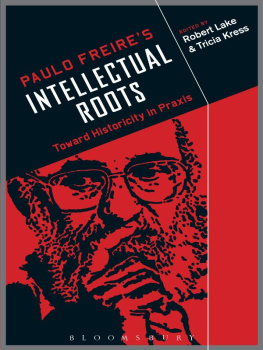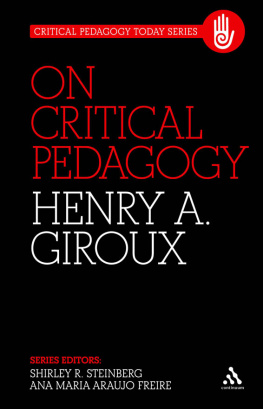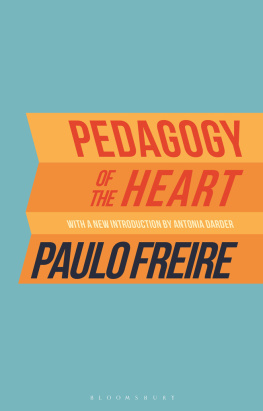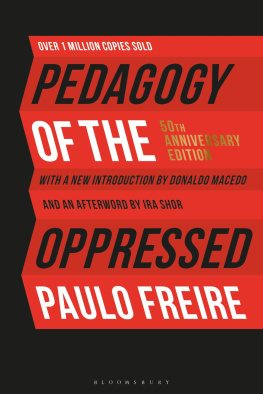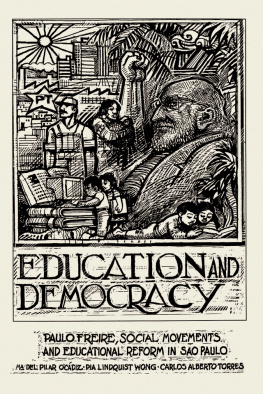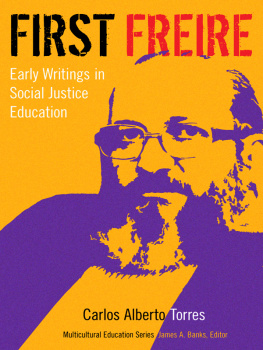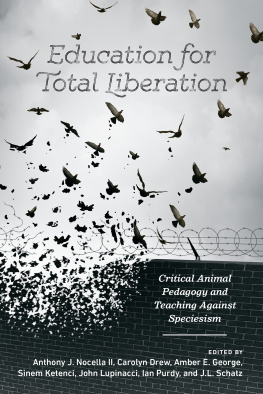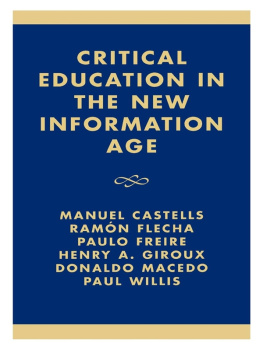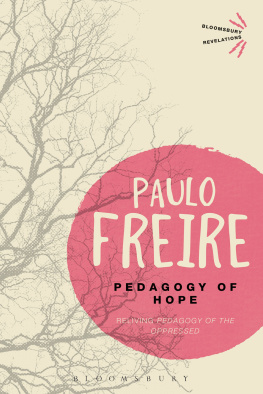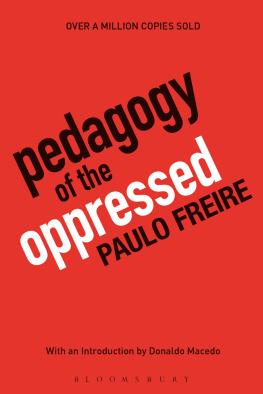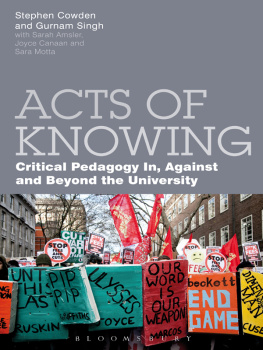Paulo Freires
Intellectual
Roots
Toward Historicity in Praxis
Edited by
Robert Lake
and
Tricia Kress

Bloomsbury Academic
An imprint of Bloomsbury Publishing Plc
175 Fifth Avenue New York NY 10010 USA
50 Bedford Square London WC1B 3DP UK
www.bloomsbury.com
First published 2013
Robert Lake, Tricia Kress, and contributors 2013
All rights reserved. No part of this publication may be reproduced or transmitted in any form or by any means, electronic or mechanical, including photocopying, recording, or any information storage or retrieval system, without prior permission in writing from the publishers.
No responsibility for loss caused to any individual or organization acting on or refraining from action as a result of the material in this publication can be accepted by Bloomsbury Academic or the author.
Library of Congress Cataloging-in-Publication Data
A catalogue record for this book is available from the Library of Congress.
ISBN: 978-1-4411-5442-2
CONTENTS
First of all we want to thank the 14 people who contributed to this book. We are keenly aware that you had to take time away from other projects, deadlines, family responsibilities, and so many other commitments to write for this project. Many of you have known Freires work for many years, and some have recently become more intimately acquainted with the body of his work, yet all of you have helped construct this volume that provides a portrait of Freires intellectual genealogy and, in so doing, shows your place in the critical pedagogy family tree.
We also want to thank David Barker and everyone at Bloomsbury Publishers for their vision of advancing the heritage and future of Paulo Freires work in ways that make a project like this possible and for allowing us to reprint a rare autobiographical piece by Freire. Thank you to Robert Lakes graduate assistant Amber Bryan for transcribing this piece.
We are grateful to Pablo Fontdevila for allowing us to use his artistic rendering of Paulo for the cover of this book. We are deeply appreciative of two of Freires personal colleagues, Henry Giroux and Stanley Aronowitz for providing the prologue and the introduction to this book. We also thank Ana Cruz for her work of translating the documents that provided the basis for her chapter.
Henry Giroux
Paulo Freire is one of the most important critical educators of the twentieth century. Not only is he considered one of the founders of critical pedagogy, but he also played a crucial role in developing a highly successful literacy campaign in Brazil before the onslaught of the junta in 1964. Once the military took over the government, Freire was imprisoned for a short time for his efforts. He was eventually released and went into exile, primarily in Chile and later in Geneva, Switzerland, for a number of years. Once a semblance of democracy returned to Brazil, he went back to his country in 1980 and played a significant role in shaping its educational policies until his untimely death in 1997. His book, Pedagogy of the Oppressed, is considered one of the classic texts of critical pedagogy, and has sold over a million copies, influencing generations of teachers and intellectuals both in the United States and abroad. Since the 1980s, there has been no intellectual on the North American educational scene who has matched either his theoretical rigor or his moral courage. Most schools and colleges of education are now dominated by conservative ideologies, hooked on methods, slavishly wedded to instrumentalized accountability measures, and run by administrators who lack either a broader vision or a critical understanding of education as a force for strengthening the imagination and expanding democratic public life.
As the market-driven logic of neoliberal capitalism continues to devalue all aspects of the public good, one consequence has been that the educational concern with excellence has been removed from matters of equity, while the notion of schooling as a public good has largely been reduced to a private good. Both public and higher education are largely defined through the corporate demand that they provide the skills, knowledge, and credentials that will provide the workforce necessary for the United States to compete and maintain its role as the major global economic and military power. Consequently, there is little interest in both public and higher education, and most importantly in many schools of education, for understanding pedagogy as a deeply civic, political, and moral practicethat is, pedagogy as a practice for freedom. As schooling is increasingly subordinated to a corporate order, any vestige of critical education is replaced by training and the promise of economic security. Similarly, pedagogy is now subordinated to the narrow regime of teaching to the test coupled with an often harsh system of disciplinary control, both of which mutually reinforce each other. In addition, teachers are increasingly reduced to the status of technicians and deskilled as they are removed from having any control over their classrooms or school governance structures. Teaching to the test and the corporatization of education becomes a way of taming students and invoking modes of corporate governance in which public school teachers become deskilled and an increasing number of higher education faculty are reduced to part-time positions, constituting the new subaltern class of academic labor.
But there is more at stake here than a crisis of authority and the repression of critical thought. Too many classrooms at all levels of schooling now resemble a dead zone, where any vestige of critical thinking, self-reflection, and imagination quickly migrate to sites outside of the school only to be mediated and corrupted by a corporate-driven media culture. The major issue now driving public schooling is how to teach for the test, while disciplining those students who because of their class and race undermine a schools district ranking in the ethically sterile and bloodless world of high stakes testing and empirical score cards.be self-reflective about public issues and the world in which they live. As Stanley Aronowitz puts it:
Few of even the so-called educators ask the question: What matters beyond the reading, writing, and numeracy that are presumably taught in the elementary and secondary grades? The old question of what a kid needs to become an informed citizen capable of participating in making the large and small public decisions that affect the larger world as well as everyday life receives honorable mention but not serious consideration. These unasked questions are symptoms of a new regime of educational expectations that privileges job readiness above any other educational values. (2008, p. xii)
Against this regime of scientific idiocy and bare pedagogy stripped of all critical elements of teaching and learning, Freire believed that all education in the broadest sense was part of a project of freedom and eminently political because it offered students the conditions for self-reflection, a self-managed life, and particular notions of critical agency. As Aronowitz puts it in his analysis of Freires work on literacy and critical pedagogy:
Thus, for Freire, literacy was not a means to prepare students for the world of subordinated labor or careers, but a preparation for a self-managed life. And self-management could only occur when people have fulfilled three goals of education: self-reflection, that is, realizing the famous poetic phrase, know thyself, which is an understanding of the world in which they live, in its economic, political and, equally important, its psychological dimensions. Specifically critical pedagogy helps the learner become aware of the forces that have hitherto ruled their lives and especially shaped their consciousness. The third goal is to help set the conditions for producing a new life, a new set of arrangements where power has been, at least in tendency, transferred to those who literally make the social world by transforming nature and themselves. (see Aronowitz, 2009, p. ix)
Next page
